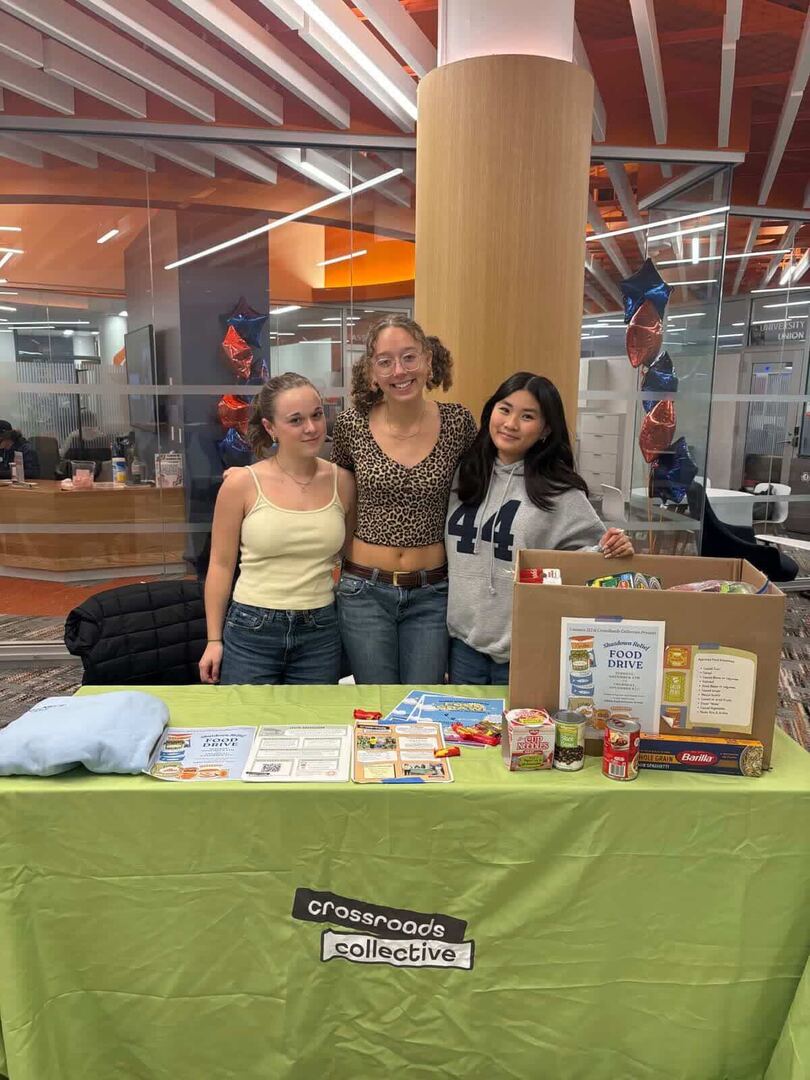Student organizations launched food drive during government shutdown, SNAP cuts

Connect 315 and the Crossroads Collective, student-run organizations at Syracuse University, hosted a food drive to support families affected by cuts to SNAP benefits. Over 100,000 central New Yorkers rely on the food assistance program. Courtesy of Miles Scherer
Get the latest Syracuse news delivered right to your inbox.
Subscribe to our newsletter here.
As the longest United States government shutdown cut Supplemental Nutrition Assistance Program benefits, Syracuse University clubs hosted a food drive to alleviate its impact. The organizations hope the conversation will continue beyond the donation drive’s three-day span.
“The drive restored a faith in community that feels hard to find these days, and it was nice to remember that there’s always people out there willing to share support,” said Ashley Woods, SU junior and co-chief operating officer for Connect 315.
With over 100,000 central New Yorkers relying on SNAP, the pause left many struggling to afford meals. For Connect 315 and Crossroads Collective, the drive was about more than just donations — it was about community solidarity in a time of uncertainty.
“Turnout among students was overwhelming and exemplified community support. Students not only provided donations but also spread the word and became more informed on how the shutdown impacted communities nationwide,” Leah Farrell, SU senior and president of Connect 315, said.
The drive gathered students, faculty and staff, showing support for families impacted by the nationwide SNAP benefits pause and providing shutdown relief.
In the atrium of the Schine Student Center, a stream of nonperishable donations, including cans of tuna, boxes of cereal, jars of peanut butter, rice and canned soup, was donated to the Food Bank of Central New York.
Woods said every box was filled with food every day, even receiving donation requests after the event closed for the day.
SU Junior and President of Crossroads Collective, Miles Scherer, said both organizations are “super proud” of the turnout and that the SU community is eager to create more pathways to connect and support one another.
Scherer, who joined Crossroads Collective during his freshman year, said the experience opened his eyes to the organization’s broader purpose, beyond on-campus work.
Since its founding, Crossroads Collective aims to “bridge the gap” between the campus and the broader Syracuse community through music, arts programming and volunteering opportunities, Scherer said.
“The food drive was a collaboration with Connect 315, an organization that encourages public discussion related to policy in Syracuse,” Scherer said. “We combat food insecurity throughout Syracuse, and between our organizations, we reached as many eyes as possible.”
Woods reflected on the personal connections the drive fostered. She has several friends she hadn’t spoken to since her freshman year who reached out to donate.
“It was a very sweet reminder of how people still come together for others when you least expect it,” Woods said.
In just a few days, Connect 315 worked closely with Crossroads Collective to organize and promote the food drive, Scherer said. Their collective goal was to gather enough donations to help alleviate the burden on residents and local food banks, already strained by the shutdown.
“Connect 315 prioritizes our on and off campus engagement, with a focus on a unique social issue each year,” Farrell said. “This year, we’ve focused on food insecurity and how it relates to communities across Syracuse.”
Scherer said Syracuse’s long history of high rates of food insecurity and child poverty in the nation is a direct result of failed governance, racially discriminatory public policy and “Rust Belt-like” economic conditions.
Scherer added the SNAP cuts added “gasoline to the fire.”
“In this country, that’s a travesty, and it’s our responsibility as citizens to band together in the face of these conditions,” he said.
In New York state alone, more than 1.7 million households rely on SNAP, accounting for over 14% of the state’s population. Amid federal inaction, state officials declared a “food emergency” for local food banks and pantries.
Club organizers said while student households may not directly rely on SNAP, the ripple effect of benefit cuts extends to the broader community, including working families, service-industry employees, campus support staff and local vendors.
The initiative amplified awareness with flyers posted across campus and social media posts tagging the two student groups, explaining the “why” behind the drive.
Farrell said the biggest takeaway of the drive was getting involved and engaging with social issues to build meaningful relationships with the city, beyond the university.
For the Food Bank of Central New York, the donations arrived at a critical moment, Scherer said. About 187,000 people in the food bank’s service area are food insecure, Central Current reported.
Community-led initiatives like the drive create formal relief systems and reinforce that hunger is a shared concern among the Syracuse community and beyond, Farrell said.
“This is about awareness. We live in a bubble at SU. Our mission is to burst that bubble and connect people through shared languages of food, music and the arts,” Scherer said. “We are eager to continue that mission, and the food drive was just one iteration of that.”


